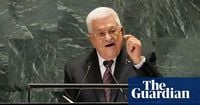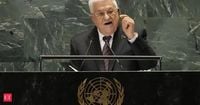In a dramatic turn at the United Nations this week, the General Assembly voted overwhelmingly to allow Palestinian President Mahmoud Abbas to address its annual gathering of world leaders by video, after the United States revoked his visa last month. The move, which passed on September 19, 2025, by a margin of 145-5 with six abstentions, marks a rare rebuke of the US by the wider international community and throws fresh light on the deepening divides over the Israeli-Palestinian conflict.
The decision came after weeks of diplomatic wrangling and mounting frustration among Palestinian officials. Abbas, who leads the Palestinian Authority, had been slated to attend a high-profile summit in New York hosted by France and Saudi Arabia on September 22, a day before the General Assembly’s speeches begin. The summit aims to revive momentum for a two-state solution—an elusive goal in a region scarred by decades of violence and political deadlock.
But hopes for Abbas’s in-person appearance were dashed when the US State Department revoked his visa, along with those of nearly 80 other Palestinian officials. The US cited national security concerns and accused the Palestinian leadership of undermining peace efforts. According to AP, the visa ban extended to virtually the entire Palestinian delegation, effectively barring them from both the summit and the UN’s high-level week.
This move did not go unnoticed. Many US allies, including France and the United Kingdom, lobbied Washington to reconsider the ban in the days leading up to the vote. Their efforts, however, fell flat. The United Nations itself weighed in, calling the US decision a violation of the Host Country Agreement—a longstanding pact requiring the US to allow heads of state and government to travel to New York for diplomatic business and the annual UN gatherings.
In response, the General Assembly passed a resolution stating, “The State of Palestine may submit a pre-recorded statement of its President, which will be played in the General Assembly Hall.” According to The Economic Times, this workaround allows Abbas to participate virtually, sidestepping the US-imposed travel restrictions but underscoring the extraordinary nature of this year’s proceedings.
For Abbas, the timing could hardly be more critical. The summit hosted by France and Saudi Arabia is expected to see several Western countries—including France, the United Kingdom, Canada, Belgium, and Australia—formally recognize a Palestinian state. Britain’s Deputy Prime Minister David Lammy is poised to make the UK’s announcement on September 21, with a pointed message: any future Palestinian government must exclude Hamas. As The Guardian reports, Abbas had intended to use his address to thank these nations and lay out his vision for a future Palestine free from Hamas rule.
The United States, however, stands firmly opposed to these recognition efforts. According to AP, the US argues that promises of statehood have emboldened Hamas and complicated efforts to broker a ceasefire and secure the release of hostages in Gaza. Israeli Prime Minister Benjamin Netanyahu’s government, which was already opposed to Palestinian statehood before the war triggered by Hamas’s October 7, 2023, attack, now contends that recognition would reward the militant group.
Ceasefire negotiations have faltered. Talks collapsed in July after the Trump administration’s Mideast envoy, Steve Witkoff, walked away, blaming Hamas for the impasse. The situation deteriorated further when Israel launched a strike targeting Hamas leaders in Qatar, a country that has played a key mediating role throughout the conflict.
The backdrop to these diplomatic maneuvers is grim. According to local health officials cited by Al Jazeera, Israel’s war on Gaza since October 2023 has killed at least 65,141 people and wounded 165,925, with thousands more believed to be buried in the rubble. The violence has fueled growing international outrage and prompted a wave of countries—especially in Europe—to announce intentions to back Palestinian statehood at the UN this September.
Yet, the Palestinian Authority itself is not without controversy. Led by Abbas, whose mandate expired in 2009, the Authority governs parts of the Israeli-occupied West Bank and recognizes Israel, cooperating on security matters. However, Israel accuses the Authority of incitement and questions its commitment to peace. Many Palestinians, for their part, view their leadership as corrupt and autocratic. Polls in recent years show a vast majority want Abbas, now 89, to resign. There have been no national elections since 2006, when Hamas won in a landslide.
As the General Assembly’s high-level week approaches, the focus remains squarely on Gaza and the broader push for Palestinian self-determination. “Gaza is issue number one at the UN General Assembly,” reported Al Jazeera’s Diplomatic Editor James Bays from New York. “All leaders come here and give their speeches. But on this occasion … Mahmoud Abbas has been denied a visa … which is very unusual.” Bays described the overwhelming vote in favor of Abbas’s video address as a “snapshot of international opinion on Palestine and Gaza,” highlighting the growing isolation of the US and Israel on the world stage.
Meanwhile, other diplomatic flashpoints are simmering. The UN Security Council on September 19 rejected a resolution to permanently lift sanctions on Iran, with France, the UK, and Germany pushing for their reimposition amid concerns over Iran’s nuclear program. Iran, for its part, described the actions as “illegal, unjustified and provocative,” and has signaled a willingness to reopen talks—though US officials have yet to respond. The Israeli prime minister is set to address the General Assembly on September 26 and will meet with Trump in Washington soon after, as tensions over Iran’s nuclear ambitions and the future of the region remain high.
For Palestinians, the events of this week are both symbolic and practical. The video address granted to Abbas is a workaround that underscores the limitations imposed by the US, but also a testament to the breadth of international support for Palestinian representation at the UN. It comes at a time when the debate over statehood, the future of Gaza, and the legitimacy of Palestinian leadership is more heated than ever.
As world leaders prepare to gather in New York, the question of Palestine’s future—its leadership, its borders, and its very right to statehood—remains unresolved. But the events at the UN this week have made one thing clear: the issue is not going away, and the world is watching closely to see what comes next.


